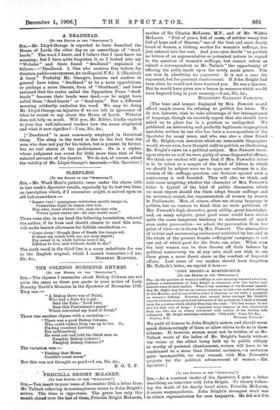PRISCILLA BRIGHT McLAREN. go Tax EDITOR Of THR 'EPRCTATOR."J BlE i —YOE
insert in your issue of November 24th a letter from Mr. Tallack referring in contemptuous terms to John Bright's sisters. The time is opportune. The grave has only this month closed over the last of them, Priscilla Bright McLaren, mother of Sir Charles McLaren, M.P., and of Mr. Walter McLaren. "Full of years, fall of cares, of neither weary but full of hope and of Heaven," one of the beat and most dearly loved of women, a lifelong worker for women's suffrage, has just entered into her rest. And you—you decide "to publish no letters of an argumentative or polemical nature in regard to the question of women's suffrage, but cannot refuse so valued a correspondent as Mr. Tallack " the opportunity of offering his petty insult upon her newly made grave. You are wise in admitting no argument. It is not a case for argument, but for personal chastisement. If John Bright had been alive, he would not have touched you. He was a Quaker. But he would have given you a lesson in manners which would have lingered long in your memory.—I am, Sir, Sze.,
MILLICENT GARRETT FAWCETT.
(The tone and temper displayed by Mrs. Fawcett would afford ample reason for refusing to publish her letter. We do not, however,, wish to take advantage of her intemperance of language, though we sincerely regret that she should have asked us to place her in a position so undignified. We published an interesting and perfectly legitimate biographical anecdote, written by one who has been a correspondent of the Spectator for many years, and who was also a clbse friend of Mr. Bright,—an anecdote which no reasonable biographer would, we are sure, have thought unfit to publish as illustrating Mr. Bright's views on a political subject. Mrs. Fawcett there. upon attacks us as if we were guilty of some disgraceful offence. We think our readers will agree that if Mrs. Fawcett's letter is to be taken as a sample of the kind of letters to which we should be subject were we to open our columns to a dis- cussion of the suffrage question, our decision against such a controversy is well founded. They will also, we think, ask with some misgiving whether the character of Mrs. Fawcett's letter is typical of the kind of public discussion which we must expect should the State adopt female suffrage and its necessary sequel, the representation of women by women in Parliament. Men, of course, often use strong language in politics, but we venture to think that no male politician of Mrs. Fawcett's high character, great ability, great knowledge, and, on many subjects, great good sense would have shown quite the same dangerous tendency to excitement of mind, even under provocation—we admit the provocation from her point of view—as is shown by Mrs. Fawcett. The atmosphere of violent and unreasoning excitement exhibited by her, and in the whole of the present female suffragists' campaign, is not one out of which good for the State can arise. When even the best women can be thus thrown off their balance by political controversy we, at any rate, shall not wish to see them given a more direct share in the conduct of Imperial affairs. Lest some of our readers should have .forgotten Mr. Tallack's letter, we reprint it here
JOHN BRIGHT—A REMINISCENCE.
[To PHI EDITOR OF TIER .91.110TATOR.1 818,—.Lui the question of women's suffrage is now receiving renewed attention, perhaps a reminiscence of John Bright in connexion with this matter may Interest some of your readers. When I was secretary of the Howard Associa- tion Mr. Bright sent for me on various occasions to talk over matters relating to that Society, and at one of these times I observed on his table a pamphlet on women's suffrage. Knowing that several ladies amongst Mr. Brightl nearest relatives were prominent advocates of the movement, I made a remark upon the question which elicited from him the reply: • The bast woman do not care for that sort of thing.' I expressed some surprise at this observation from one who was so closely connelted with certain of the leading lady suffragists. Mr. Bright smilingly exclaimed: ' Billy girls.'—I am, Sir, ac., Clayton, 11.E.
WILLIAM TALLACC."
We yield all honour to John Bright's sisters, and should never speak dishononringly of them or allow others to do so in these columns. If, however, women must not be written of as Mr. Tallack wrote of the ladies of Mr. Bright's family without the writer or the editor being held up to public obliquy as worthy of personal chastisement, women will have to be condemned to a more than Oriental seclusion,—a seclusion quite incompatible, we may remark, with Mrs. Fawcett's projects for the political advancement of women.—En. Spectator.]






























































 Previous page
Previous page